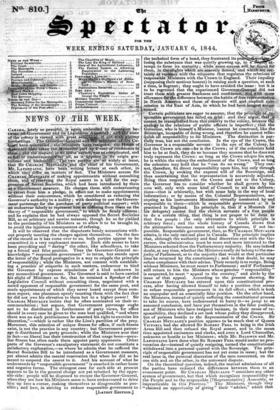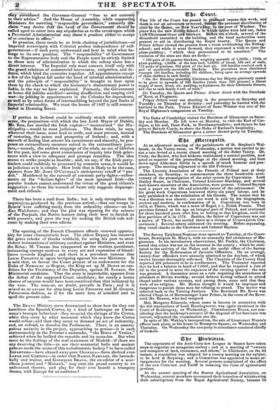NEWS OF THE WEEK.
: : 13. 139-- CANADA, lately so peaceful, is again embroiled b dies tween,ittitovernment and its Legislative ;. estate of the colony is viewedivilfi-freat po-only forebedings. The POT/Whorl.einertil a, 1.TA'e - have, ittrarecc;:tlielMinisters 'hiv re. :d.;-.t1115 +AA of mb1S1 b ettikkeit the AliiiistatiVpaft .vote-Of ednfidence in
h.
dispute, iri'kilktIshisOdtrwas as complicated, and 3f embariassnirgifor all, as it'aimearl:iii7its origin gra-
tuitous and blarqa 1-1Vtwo paritea' tire. a widely at issue, that Sir CHARLES the chief of his Government, Mr. LAFONTAINE, haVe -bEeri writing letters at each other, in which they differ on "mattersof fact. The Ministers accuse Sir CHARLES,..METALER of making appointments without consulting them, and of reserving the Royal assent to a bill for the sup- pression a Secret Societies, which had been introduced by them a' Government measure. He charges them with endeavouring to extort from him a pledge, in effect not to make appointments without their concurrence, which he considered as reducing the Governor's authority to a nullity ; with desiring to use the Govern- ment patronage for the purchase of party political support; with an endeavour falsely to represent him its-differing from them on the theory of " responsible government," to which he firmly adheres: and he explains that he had always opposed the Secret Societies Bill, as an arbitrary and unwise measure, though be so far yielded to the pertinacity of his Ministers as to allow it to be brought in, to avoid the injurious consequences of refusing. It will be observed that the disputants bandy accusations with- out properly meeting the charges against themselves. On the face of the record as it has come over to us, both parties appear to be committed in a very unpleasant manner. Each side seems to have been provoking and ' daring" the other, like schoolboys, to take up a forced and false position. Thus the Governor-General ac- knowledges "responsible government" in terms, but stands upon the letter of the Royal prerogative in a way to cripple the principle of responsibility ; while the Ministers, not content with establish- ing a practice of etiquette in such matters, endeavour to bind the Governor by express stipulations of a kind unknown in any monarchical government. The Governor is said to have carried his slight of Ministers' so far, that he retained a Speaker of the Legislative Council without consulting them, negotiated with a noted opponent of responsible government for the same post, and made appointments of which they never heard except from com- mon report, one placeman openly taunting them with the fact that he did not owe his elevation to them but to a higher power! Sir CHARLES METCALFE insists that he often nominated on their re- commendation ; but argues, that Government patronage ought not to be distributed in furtherance of party views, for office should in every case be given to the man best qualified, " and where there was no such preeminence he asserted his right to exercise his discretion,"—which is rather like the Lion's partition of the prey. Moreover, this selection of unique fitness for office, if such fitness exist, is not the practice in any country ; but Government patron- age is distributed on party grounds ; while the Ministers aver that in fact—so liberal has their construction of that usage been—pecu- liar fitness has often made them appoint party opponents. Other parts of the Governor's exculpatory statement do not constitute a satisfactory explanation,—as where he admits that he suffered the Secret Societies Bill to be introduced as a Government measure, yet almost admits the mental reservation that when he did so he meant to suspend the assent to it. And his account of what he understands by "responsible government" is couched in rather loose and negative terms. The strongest case for each side at present appears to lie in the general charge not yet rebutted by the oppo- site side : people will be disposed to excuse the Governor-General, when they see how his Ministers seem to have endeavoured to drive him up into a corner, making themselves as disagreeable as pos- sible; and how, in striving to reduce responsible government to
the technical form of a bond, they frustrated its pra losing the substance that was quietly growing up, in a at- tempt to force its maturity ; while some excuse fRimel for
them, in that Tights which are scarcely denied; and which.aie cer- tainly- at variftvei with the etiquette that regulates the relations of responsible Ministers with the Crown in England. Their impolicy (supposing their motives honest) in raising such a question, at such a time, is flagrant; they ought to have avoided the issue : but it is to be regretted that the experienced GoverporaGenenj slid not treat them with greater frankness and confidenebt..04,tith -mow allowance foi-Lthe difference between the habits of free retilesentation in _North America and those of despotic will and implicit stibi _mission in the test of Asia, to which he had beenTienteat VINO
omed.
Certain politicians are eager to assume, that- the princ g.pf
sponsible government has failed on : and they argue, tha cannot be transphnifed from this country to the colony, because analogy in the relations of public officers is imperfect; the Governor, who is himself a Minister, cannot be construed, like the Sovereign, incapable of doing wrong, and therefore he cannot relin- quish all responsibility to his Ministers. The distinction is par-
..-
}hilly true, but not the conclusion. In the eye of the Crown, the Governor is a responsible servant : in the eye of the Colony, he and the Crown are-one—he is the Crown; or if the colonists hold him to be at fault, they do so because they assume that he does not truly represent the Crown : so long as the Crown adopts his acts, he is within the colony the embodiment of the Crown, and so long the colonists may hold that he "can do no wrong." They can- not, therefore, fix direct responsibility upon him, but only through the Crown, by evoking the express will of the Sovereign, and thus ascertaining that the representation is accurately adjusted. Being thus responsible to the Crown and not to the Colony, the Governor has to consider whether he shall govern by his own will, only with some kind of Council to aid his delibera• tions—that is arbitrarily, but with some help in the way of local information ; or by means of the. Colonial Representatives, ac- cepting as his instruments Ministers virtually nominated by and responsible to them—which is responsible government az it is practised in England. Its principle is, that if a Monarch (or his delegate) cannot find the chosen servants of a free people to do a certain thing, that thing is not proper to be done to that free people : the only alternative to which principle is arbitrary force ; and the whole history of Canada shows that the alternative becomes more and more dangerous, if not im- possible. Responsible government, then, as Sir CHARLES METCALFE admits, is the only rational plan in Canada. The principle implies that, although the authority and final discretion rest with the Go- vernor, the administration must be more and more intrusted to the Ministers selected from the Parliamentary majority. He may indeed doubt, at any time, whether the Ministers really do belong to the ma- jority of Parliament, or to the majority that would at that particular time be returned by the constituency ; and in that doubt, he may refuse compliance with their advice. Their remedy is to resign. Being without Ministers, he must resort to Parliament ; and if Parliament still return to him the Ministers whose genuine " responsibility " is suspected, he must " appeal to the country," and abide by the issue of that appeal. According to the present showing, Sir CHARLES METCALFE has entered upon this constitutional pro- cess, after having allowed himself to take a position that seems to refuse responsible government in its full effect ; which is both an unpopular and an essentially false position. On the other hand, the Ministers, instead of quietly suffering the constitutional process to take its course, have endeavoured to hurry it—to jump to an assumed conclusion, and have put themselves in the false position, not of Ministers who have resigned because, in their sense of re- sponsibility, they declined a set task whose policy they disapproved, but of persons hostile to the Representative of the Crown. Sir CHARLES METCA.LFE'S position appears to be much that of Queen Vic.roala had she allowed Sir ROBERT PEEL to bring in the Irish Arms Bill and then refused the Royal assent, and in the mean time appointed excisemen and clerks, and even a Lord Chancellor, unknown or hostile to her Ministers ; while Mr. BALDWIN and Mr. LAFONTAINE have done what Sir ROBERT PEEL would under no pro- vocation do—instead of quietly resigning, turned the constitutional withdrawal into a personal quarrel with the Sovereign. The prin- ciple of responsible government has not yet come in issue; but the real issue is, the personal discretion of the men concerned, on the one side and on the other, in the untoward dispute.
On the theoretical question, indeed, the mutual admissions of all the parties have reduced the differences between them to an evanescent point. Sir CHARLES METCALFE " considers any other
system of government, but that which recognizes responsibility to the People and to the responsible [?Representative] Assembly, as impracticable in this Province." The Ministers, though they "claimed an opportunity of giving" their "advice," admit that they` considered the Governor-General " free to act contrary to their advice." And the House of Assembly, while supporting Ministers for asserting "responsible governffient," earnestly dis- claim "any desire that the head of the Government should be called upon to enter into any stipulation as to the ternutupon which a Provincial Administration may deem it prudent either to accept of or continue in office."
In practice, there needs be as little clashing of jurisdictions—of Imperial sovereignty with Colonial perfect independence of self- government—if each party understand and bear in mind what be- longs to its own position. The " responsibility" of Government to-the Representative body and the People must be strictly limited to those acts of administration in which the colony alone has a direct• interest. The Imperial rule must concern itself only with -thegrand relations of commercial intercourse, emigration, and de- fence, which bind the countries together. All appointments except a few of the highest fall under the head of internal administration ; and the principle of "responsibility" is brought to bear upon them by the check to which the Governor's discretionary power is liable, in the way we have explained. Formerly, the Government trhome did infinite mischief—sowing disaffection and reaping civil near—by jobbing in appointments in the Colonies for dependents, nevelt as by other forms of intermeddling beyond the just limits of I-imperial relationship. We trust the lesson of 1837 is still remem- bered in Downing Street.































 Previous page
Previous page